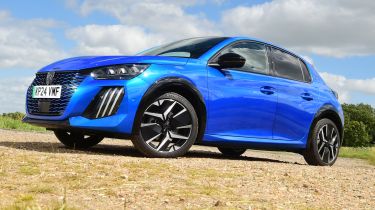Peugeot E-208: range, battery & charging
A bigger battery means the Peugeot E-208 can now go further than before, but some cheaper rivals have longer legs
| Model | Range | Wallbox charge time | Rapid charge time |
| 50kWh | 225 miles | 7hrs 30 mins (0-100%, 7.4kW) | 30 mins (10-80%, 100kW) |
| 51kWh | 258 miles | 7hrs 30 mins (0-100%, 7.4kW) | 30 mins (10-80%, 100kW) |
The Peugeot E-208 is available with two battery sizes, and the larger of the pair was first introduced in the bigger Jeep Avenger SUV before being rolled out to other Stellantis EVs. Either pack should give drivers a range of over 200 miles in real-world driving, although cheaper rivals such as the MG4 EV Long Range can go significantly further on a charge. Still, 100kW DC rapid charging should make the occasional longer journey a breeze.
Peugeot E-208 range
The smaller of the two battery packs offered in the Peugeot E-208 provides a range of up to 225 miles – more than what’s possible in the Fiat 500e or Citroen e-C3. Based on our time with the electric supermini, a real-world range of around 200 miles is certainly achievable in summer, while closer to 150 miles would be more likely during the colder months.
If you’re prepared to fork out for the top-of-the-range GT trim, you’ll have the option of a slightly larger 51kWh battery pack. Peugeot claims a maximum range of 258 miles for this pack, but this fails to beat the cheaper MG4 EV SE Long Range’s 281 miles.
Charge time
You’ll need around seven-and-a-half hours to fully charge the E-208 from a 7.4kW home wallbox, which we’d certainly recommend you have installed if possible. You can also set timed charging using the touchscreen or a phone app, and plugging-in is easy; the port is on the rear flank, where you’d expect the fuel filler to be.
The E-208's maximum charging speed is 100kW, which means you can add 100 miles of range in around 20 minutes or a 10-80% top-up in around 30 minutes. If you think you might want to charge at a three-pin domestic plug occasionally, you’ll have to pay a little extra to get the necessary cable (which is a shame, as most electric cars get this as standard) and it'll take 24 hours for a full charge this way.

